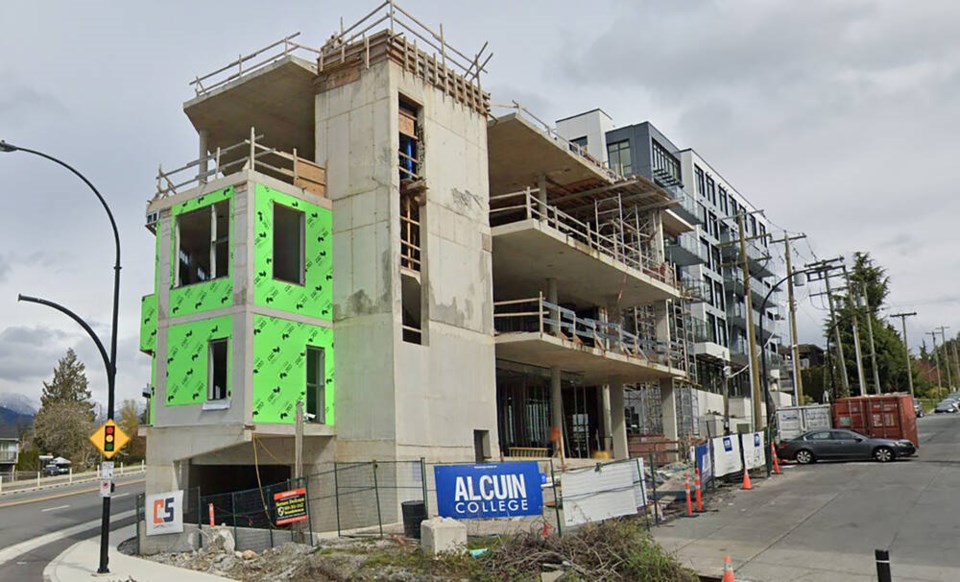The founders of a mostly built but stalled private school in Lower Lonsdale are headed to court with the building’s developer after the business relationship between the two soured.
A recently released B.C. Supreme Court decision offers some insight into the plagued Alcuin College project at the corner of West Esplanade and Mahon Avenue. Apart from some remediation work on faulty concrete, no construction has been done on the school building in almost two years.
St. Alcuin College for the Liberal Arts Society received City of North Vancouver council’s approval to build a three-storey school at the site in 2017.
In 2019, the school began discussions with Ryan Deakin, a parent of Alcuin students and principal of developer Montaigne Group Ltd., who proposed adding a fourth storey to the building to be used as event space, for the “benefit of both parties,” the ruling states.
In 2020, they struck a joint-venture agreement in which the building would be stratified or subdivided with the first three storeys belonging to Alcuin and the fourth belonging to Montaigne, thanks to the developer’s “highly competitive build cost.”
Lawyers for both parties described the agreement as “interesting,” “unusual,” and “unique,” Justice Eric Gottardi acknowledged in his Jan. 9 written ruling.
The proposal for the extra storey was highly divisive in the community, with neighbours raising opposition on the grounds that event space would result in late-night noise, blocked views, added traffic and demand for street parking. During a five-and-a-half hour public hearing in March 2021, Alcuin students, parents and alumni turned out in large numbers to urge council to approve the extra storey. The vote passed 6-1 after the public hearing.
But, according to the court’s ruling, the college terminated its agreement with Montaigne in April 2023, with each side claiming the other breached their agreement, leading to several court actions.
Montaigne sought an order requiring Alcuin to “take all necessary further action” to stratify or subdivide amenity transfer legal title to Montaigne, as the agreement specified. The developer also put a certificate of pending litigation on the Alcuin property’s title.
Alcuin applied to have the case dismissed summarily, arguing Montaigne was bound to fail in its civil claim because construction was still required to complete the project and therefore, the developer did not have an equitable interest in the property.
According to the college, it will take another $9.5 million to finish construction of the building, and Vancity Credit Union will not advance any further financing while Montaigne’s certificate of pending litigation remains on the property’s title.
Montaigne, however, said the work could be advanced far enough for stratification for another $300,000 to $400,000.
On the motion to dismiss the claim, Gottardi sided with Montaigne.
“In my view, the college has failed to demonstrate that it is plain and obvious that no triable issues arise in respect of Montaigne’s claim for specific performance. To the contrary, there are several aspects of the claim that give rise to triable issues, the determination of which will require the evidence to be weighed and potentially credibility findings to be made,” he wrote.
Alcuin also sought to have the certificate of pending litigation cancelled on the grounds of hardship – the Catch 22 scenario in which the college cannot stratify the fourth floor without completing construction, but it cannot finance that construction while Montaigne’s certificate of pending litigation is on title.
Beyond that, the school’s ability to attract and retain students is hampered while the new campus remains in limbo, Alcuin’s head of school Stella Ablett deposed.
Montaigne countered that Alcuin’s legal strategy to delay litigation has caused their own hardships. And Gotardi also noted that, even though Vancity will not provide further financing, records show Alcuin still profits about $1.5 million per year.
“I find that the evidence fails to establish that the college is unable to finance a much smaller amount of further construction that would take the project to a place following which the college could apply for stratification. It is one thing if stratification could only be sought after construction was fully complete and undertaken to the tune of $9 million. It is quite another if a strata plan could be obtained following a short period of construction, and with a much lower cost.”
[email protected]
twitter.com/brentrichter
brentrichter.bsky.social



